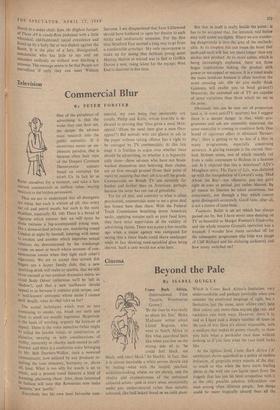Television
Commercial Blur
By PETER FORSTER
ONE of the paradoxes of advertising is that the wider they cast their net, the ' deeper the ad-men must research into the public mentality. If it sometimes seems an un- pleasant paradox, that is because often their view of the Deepest Common
Denominator appears based on contempt for nitwit Us. In fact let us natter ourselves for a moment, and take a few current commercials at surface value,. staying resistant to the hidden persuasion.
Thus we are to understand that all detergents are white, but each is whitest of all; that every car oil and petrol excels, but each is the most excellent, especially XL 100. There is a brand of cigarette which ensures that we will never be alone (witness a fag-accompanied young man, like a down-at-heel private eye, wandering round London at night by himself, loitering with intent to smoke), and another which improves sexual relations (as demonstrated by the windswept couple on moor or beach whose moment of con- summation comes when they light each other's cigarettes). We are to accept that certain fish fingers are a happy family dish, that a new sParkling drink will make us sparkle, that we will never succeed at our amateur dramatics unless we avoid Body Odour (otherwise we'll be 'left in shadow'), and that a new toothpaste should appeal to us because it contains pink stripes, and ' a 'well-known' antiseptic whose name I cannot spell. Really, what do they take us for?
The actual techniques which woo us into continuing to smoke, eat, brush our teeth and cease to smell are usually ingenious. Hyperbole Is the basis of wording, urgency the keynote of appeal. There is the voice seductive (what might be called the lanolin voice), or constructive, or Plaintive, swaying us with considerations of virility, maternity or charity, each rooted in self- interest; and there is a stentorian voice belonging to Mr. Bob Danvers-Walker, Once a newsreel commentator, now enlisted by any producer re- quiring the tone minatory, hortatory or, above all, loud. What is too silly for words is set to Music, and a present trend features a kind of !canning, plainsong chant. Also, those interested to fashion will note that Rowntrees now make Pasteels,' not 'pastils.'
Everybody has his own least favourite com-
mercial, my own being that intolerably coy couple. Philip and Katie, whose love-life is de- dicated to proving that 'Oxo gives a meal Man- appeal.' (Does the meal then give a man Oxo- appeal?) But nobody who can glance at ads in the paper without taking offence has a right to be outraged by TV commercials. At this late stage it is fruitless to argue over whether there should be advertising, or whether it is hypocriti- cally done—those ad-men who have not brain- washed themselves into believing their claims, arc on firm enough ground (from their point of view) by insisting that their job is to sell the goods. Commercials on British TV are certainly far fresher and livelier than on American, perhaps because the latter has run out of gimmicks.
Yet for all that, and contrary to what is often proclaimed, commercials seem to me a great deal less honest here than there. With the Federal Trade Commission breathing down American necks, applying statutes such as pure food laws, they have strict supervision of the validity of advertising claims. There was a case a few months ago when a major agency was castigated for saying that a razor blade could shave sandpaper while in fact showing sand-sprinkled glass being shaved. Such a case would not arise here. But that in itself is really beside the point: it has to be accepted that, for instance, real butter may melt under arc-lights. Where we are wander- ing dangerously is into the area of the uncheck- able. At its simplest this can mean the boast that such-and-such will last ten years longer than any similar new product. At its more subtle, which is being increasingly exploited, there are those bogus implications linking the product with power or sex-appeal or success. It is a trend made the more insidious because it often involves the more amusing ads. (Or do you really think Guinness will enable you to bend girders?) Moreover, the animated ads of TV are capable of more variations than those which we see in the press.
Obviously this can be seen out of proportion (and is, in some anti-ITV quarters) but I suggest there is a deeper danger in that, while pro- grammes and ads are ostensibly separated, the same mentality is coming to condition both. One brand of cigarettes offers to eliminate 'flavour- blur'; there is getting to be no less of a blur in many programmes, especially concerning accuracy. A glaring example is the current Sher- lock Holmes series, one of which recently cut from a radio announcer to Holmes in a hansom cab. Is it objected that this is American? ATV's Maugham story, The Facts of Life, was cluttered up with the interpolation of Coward's song, 'Mad About the Boy'—not offensive, just not quite right in tone or period, just rather blurred. By all means let liberties be taken sometimes, but consciously, not through a blur which cannot quite distinguish accurately. Good taste, after all, is not a matter of taste-buds.
Footnote. Ballet is an art which has always passed me by, but 1 have never seen dancing on TV as beautiful as Margot Fonteyn's Cinderella, and the whole massive Granada operation was a triumph. I wonder how many switched off for the subsequent programme (the little wax image of Cliff Richard and his ululating audience), and how many switched on?










































 Previous page
Previous page